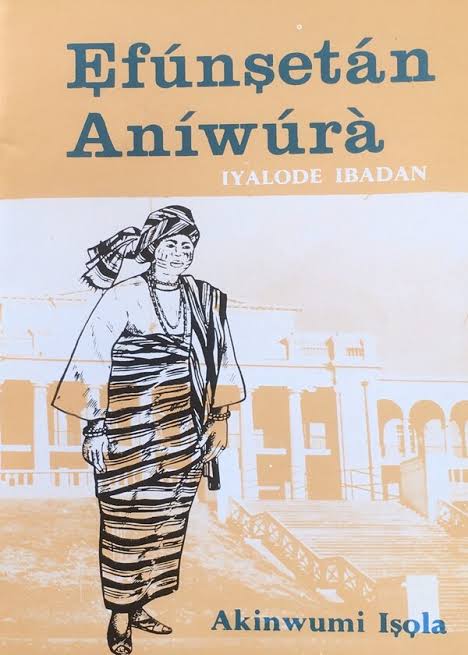📢 Follow our WhatsApp Channel for the latest literary updates!
Some of the characters in the play, Efunsetan Aniwura (1970) by Akinwumi Isola, are Iyalode Efunsetan Aniwura who is the eponymous character in the play, Ajile, Adetutu, Itawuyi, Akinkunle, Osuntunde, Awero, Akingbade, and Latoosa. These characters play important roles in the plot development of Akinwumi Isola’s play.
Let’s delve right into the roles these characters play in Efunsetan Aniwura.
Iyalode Efunsetan Aniwura
Efunsetan is a very brave and illustrious woman. She is the protagonist of the play and the second Iyalode in the history of Ibadan. In this text, the playwright portrays her as a very wicked woman who does all kinds of things to her slaves. She beats them, starves them, and kills them like animals for violating her draconian laws. She does not have a child of her own, which informs why she doesn’t want any of her female slaves to get pregnant or give birth to children.
Akinwumi Isola portrays Efunsetan as a cruel woman who doesn’t listen to the counsels of others, and perpetrates the cruelty she has set out to do regardless. This is evident in p. 18 (Scene Three) where Ayorinde, one of Latoosa’s chiefs, made reference to a tragic incidence when Efunsetan killed thirteen female slaves and twenty-eight male slaves two years back. This is further corroborated by one of Efunsetan Aniwura’s female slaves who gives a graphic description of the gory decapitation of these human beings in p. 21 (Scene Four).
The height of Efunsetan’s cruelty in the play is shown in how Efunsetan brutally kills Adetutu. The girl’s head is decapitated for the single reason that she is pregnant.
Furthermore, Efunsetan Aniwura is portrayed as a powerful woman. She is popular and famous. She has money, people at her beck and call, and charms for spiritual protection and assault. In fact, it is her spiritual power that protects her from being hypnotised by Itawuyi to eat the poisoned food prepared for her.
When the entire town become tired of her atrocities and nonchalance, they ransack her house and release her slaves from her captivity. Efunsetan herself is taken in captivity to Latoosa’s house where she poisoned herself.
Ajile
Ajile has been Efunsetan’s intimate friend since childhood. Anywhere you see Efunsetan, you must definitely see Ajile too. This is the extent of how close they are. In fact, Efunsetan often financially supports Ajile and her husband who is a friend of Latoosa.
Ajile forewarns Efunsetan about the chiefs and the commoners coming to ransack her house but Efunsetan turns deaf ears to her warning and plea for her to flee.
Adetutu
Adetutu is one of the slave girls of Efunsetan Aniwura. She is in love with Itawuyi, a slave like her. Adetutu is beheaded upon the instruction of Efunsetan when it is discovered that she is pregnant. Her death is part of the reasons the people of Ibadan decide to ransack Efunsetan’s house.
Itawuyi
Itawuyi is a male slave of Efunsetan Aniwura and one of the important characters in the play. He is portrayed as a very strong man. This is evident in how he beats Akano hands down in a wrestling contest.
He is the one that impregnated Adetutu; he later connives with Akinkunle, Iyalode’s younger brother, for the latter to claim Adetutu’s pregnancy, with the hope that Iyalode will not kill Adetutu if she gets to know that Akinkunle is responsible for her pregnancy.
After his efforts to make Adetutu survive prove abortive, Itawuyi attempts to kill Efunsetan. He puts poison in her food and tries to hypnotise her to eat the poisoned food. When that fails too, he tries to kill Efunsetan with a machete. However, Iyalode uses the gbetugbetu charm to keep his hand hanging in the air, after which she commands him to eat out of the poisoned food. This is how Itawuyi meets his tragic end in the hands of Efunsetan.

Akinkunle
Akinkunle is the younger brother of Iyalode Efunsetan Aniwura and one of the key characters in the historical play. The relationship between him and his sister shows that Efunsetan’s cruelty and nonchalance spares no one, not even someone related to her. Iyalode does not spare Adetutu’s life even when she learns that she is impregnated by Akinkunle.
Similarly, we see how Iyalode is hostile to Akinkunle in Scene Two when he comes to tell her he is embarking on a trip to see his son, Dele, who is ill. But because she doesn’t have a child of her own, Iyalode interprets Akinkunle’s goodbye visit as a mockery of her childlessness.
Osuntunde
Osuntunde is one of Efunsetan Aniwura’s male slaves and a friend of Itawuyi. He is privy to Itawuyi’s decision to poison Iyalode.
Although he was in the dark before, he is one of the few persons who know Itawuyi is responsible for Adetutu’s pregnancy, and not Akinkunle.
Awero
Awero is a female slave of Iyalode. She and Adetutu are best of friends. She is the one Itawuyi sends to poison Iyalode. She is, however, caught and forced to eat out of the poisoned soup by Efunsetan. This results into her death.
Akingbade
Akingbade is Iyalode’s older brother. In this drama text, he plays the role of an elder who does not want things to go south in his presence. This is why he gathers the elders in the neighbourhood together to beg Efunsetan to have mercy on Adetutu. They beg her to forgive Adetutu because it is Akinkunle, her younger brother, who really did trespass.
Akingbade is not unaware of the fact that his younger sister is obstinate and does not budge to other people’s admonitions. He knows the issue is dead on arrival. Yet, he does not allow this to stop him from doing what is right.
Latoosa
Aare Latoosa is the head of Ibadan chiefs. He and his chiefs are in charge of the governance of Ibadan. He plays a significant role in how Efunsetan’s excesses are eventually curtailed. He strips Efunsetan of her chieftancy title, and leads the people of Ibadan to ransack Efunsetan’s house. He is instrumental in how Efunsetan’s slaves are freed.
In other words, Aare Latoosa, with the support of his chiefs and other natives, brings an end to Efunsetan’s tyranny.
Further Reading:
- Àwọn ẹ̀dá-ìtàn nínú Ẹfúnṣetán Aníwúrà láti ọwọ́ọ Akínwùmí Ìṣọ̀lá
- Themes in Akinwumi Isola’s Efunsetan Aniwura
Also in this Category:
Join Our Social Media Channels:
- WhatsApp: Literature PADI
- Telegram: Literature PADI
- YouTube: @literaturepadi
- Facebook: Literature PADI










